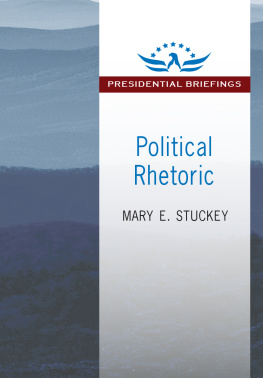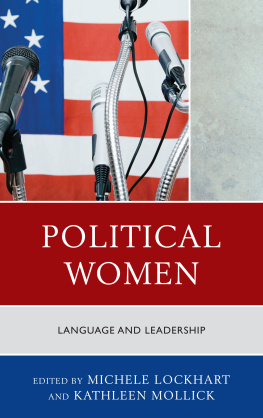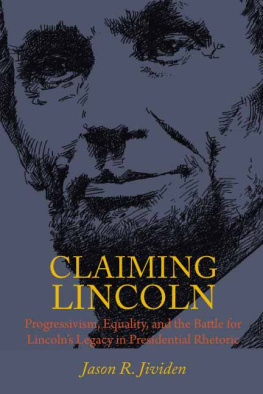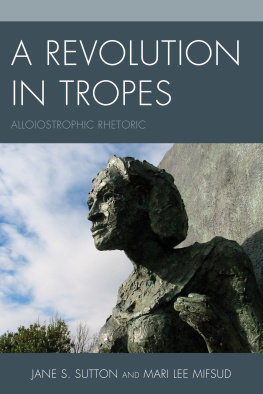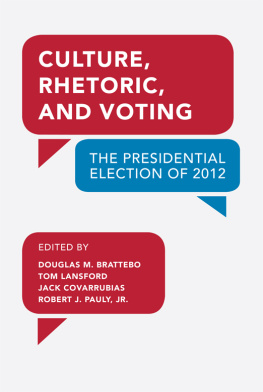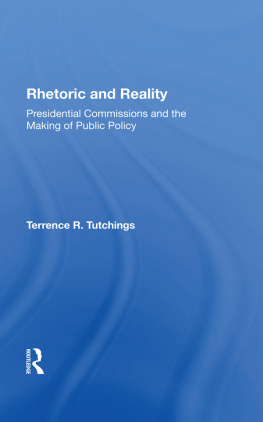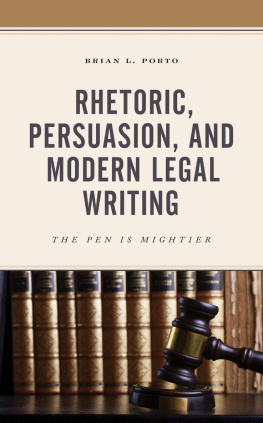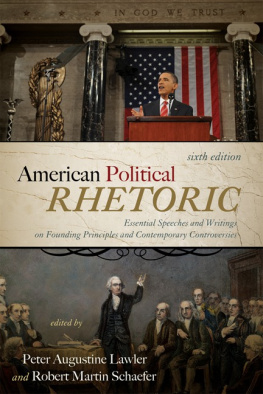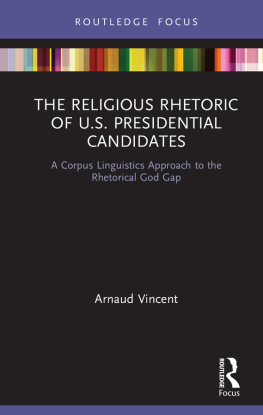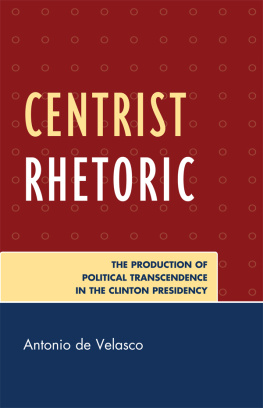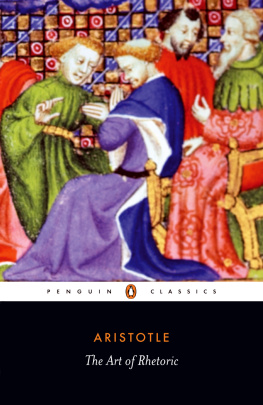Political Rhetoric
The Presidential Briefings Series
Robert J. Spitzer, Series Editor
The Presidential Briefings Series provides concise and readable introductions to topics of concern to those who have been and will be President of the United States. By approaching their subjects from the vantage point of what a president most needs to know, and what the citizenry most need to know about the presidency, these books are authoritative and significant works on subjects related to the presidency.
Previously published and forthcoming works include:
Political Rhetoric by Mary E. Stuckey
Making Foreign Policy Decisions by Christopher J. Fettweis
Presidential Leadership in an Age of Change by Michael A. Genovese
Packing the Court by Nancy Maveety
PRESIDENTIAL BRIEFINGS
Political Rhetoric
MARY E. STUCKEY
First published 2015 by Transaction Publishers
Published 2017 by Routledge
2 Park Square, Milton Park, Abingdon, Oxon OX14 4RN
711 Third Avenue, New York, NY 10017, USA
Routledge is an imprint of the Taylor & Francis Group, an informa business
Copyright 2015 by Taylor & Francis.
All rights reserved. No part of this book may be reprinted or reproduced or utilised in any form or by any electronic, mechanical, or other means, now known or hereafter invented, including photocopying and recording, or in any information storage or retrieval system, without permission in writing from the publishers.
Notice:
Product or corporate names may be trademarks or registered trademarks, and are used only for identification and explanation without intent to infringe.
Library of Congress Catalog Number: 2014035435
Library of Congress Cataloging-in-Publication Data
Stuckey, Mary E.
Rhetoric : a presidential briefing book / Mary E. Stuckey, Department of Communication.
pages cm
Includes bibliographical references.
ISBN 978-1-4128-5681-2 (cloth) -- ISBN 978-1-4128-5613-3 (pbk.) 1. Presidents--United States. 2. Presidents--United States--Language. 3. Rhetoric--Political aspects--United States. 4. Political oratory--United States. 5. Communication in politics--United States. 6. United States--Politics and government. I. Title.
JK516.S778 2015
320.973014--dc23
2014035435
ISBN-13: 978-1-4128-5613-3 (pbk)
ISBN-13: 978-1-4128-5681-2 (hbk)
This book is gratefully dedicated to Martin J. Medhurst And David Zarefsky
CONTENTS
First, I'd like to thank Tom Langston for asking me to participate in this series. Tom was a valued colleague and he will be much missed. Chris Fettweis, who is continuing Tom's good work, provided valuable advice and made many helpful suggestions. lennifer Nippins and the team at Transaction Publishers have been wonderful to work with.
The book was drafted while I was on a PROF leave provided by the College of Arts and Sciences at Georgia State University. My thanks to the Dean's office and to my Chair, who conspired to make the leave possible. During that semester, I also spent some time in Washington, DC, at the National Archives and at the Library of Congress. While there, I was a Visiting Scholar at the APSA Centennial Center for Political Science and Public Policy and a Presidency Research Group Fellow. I'm grateful to APSA for its support. That opportunity also allowed me access to the library at George Washington University, and the librarians there were both kind and helpful. I very much appreciated the kindness and scholarly acumen of the archivists at the LOC and the National Archives.
I'm also grateful to those who took time out of their preposterously busy schedules to read and comment on earlier drafts of chapters. lohn Murphy, Trevor Parry-Giles, and Colleen Shogan deserve special thanks. lason Edwards, Cara Finnegan, and lohn Rountree generously helped with citations. And, as usual, all gratitude to David Cheshier, who, in addition to his other talents, is a walking bibliography of all things rhetorical.
My life would sometimes be easier if he had fewer sources at his fingertips, but my work would be much weaker.
I agreed to work on this project while I was teaching a graduate seminar on presidential rhetoric, and that little bit of serendipity worked very much to my advantage. Even more than usual, then, I am grateful to my students, who challenged my thinking, inspired me with their interest, and honored me with their insights. Students in past seminars also helped me think through some of the issues I write about here, so thanks to Sara Baugh, Caleb Cates, Eugenia Ferrer, Zoe Hess Carney, Evan Johnson, Phil Kostka, Stephen Heidt, Rob Mills, Kim Overmier, Reynolds Patterson, and Milen Ortega Ribeiro.
This may be thefirsttime that an insurance company gets thanked in a book like this, but while I was out of town research ing, my pipes broke and my house flooded. Without the kindness and professionalism of USAA, much valuable writing time would have been lost to the process of drying out and repairing my house. And to my neighbor Cathie Herman, who realized what was hap pening and who turned my water off at the street, my undying gratitude. Because of her, nothing that mattered was damaged.
The time for writing was important but equally important was the time away from it. Those who made time for me and got me out of my head get my deepest thanks. Molly Mc Cabe, Maren Parsons Richter, Jim and Laura Parsons, thank you. I always appreciate the time my family makes for me when I can get to them: so thanks Mom, Steve, Carolee, Amanda, Robert, and Philip. And thanks to Danette for a terrific time in DC. Locally, my life would be much less interesting without Beth Gylys, Tonia Edwards, Drew Nail, Rasha Ramzy, Jennifer Barker, Melissa Stafford, Holley Wilkin, Jennifer Chatman, Sergio Gallo, and David Cheshier.
No one has done more to teach me about things rhetorical as they pertain to the presidency than Marty Medhurst and David Zarefsky. This book is dedicated to them and expresses only a small part of the debt I and all those who study presidential rhetoric owe them both.
INTRODUCTION
Communicating the Presidency
Running for re-election as the oldest president in history, Ronald Reagan knew that his age would be a campaign issue. Its importance was heightened by the fact that his opponent, Walter Mondale, was only 56 years old in 1984, and had significant experience, having served as both senator and vice-president. Asked about the age question during the second presidential debate, Reagan answered, I will not make age an issue of this campaign. I am not going to exploit, for political purposes, my opponent's youth and inexperience. This apparently trivial quip demonstrated that at age 73, Reagan still had his wits about him and thus defused the age issue. This demonstration apparently trumped the numerous mistakes of fact and other verbal stumbles that were also part of Reagan's public performance during the 1984 campaign. Without ever making an actual argument or addressing the very real questions surrounding his age and mental capacities, Reagan's humor took the issue of his fitness for office off the political table. It was a masterful exhibition of rhetorical skill.
But it was not without precedent. In 1944, running for a previously unimaginable fourth term, a tired and increasingly frail Franklin D. Roosevelt faced similar questions about his fitness for office. He also refused to respond directly to such questions. He too defused them with humor. Taking the fight straight to the Republicans, FDR said,

